
Find Help
More Items From Ergsy search
-
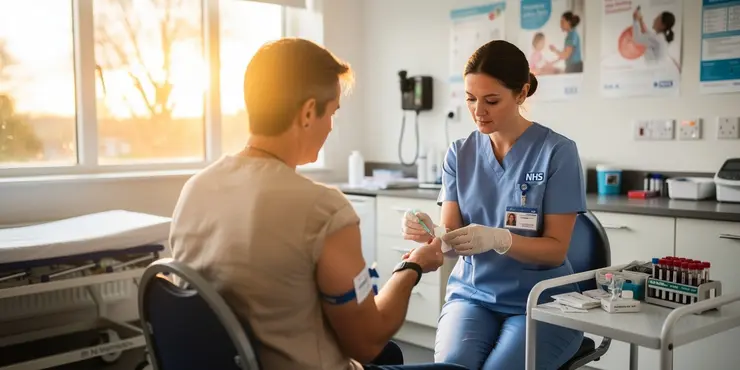
Is Chagas disease a concern with blood transfusions?
Relevance: 100%
-

What diseases can be spread by blood transfusions?
Relevance: 98%
-
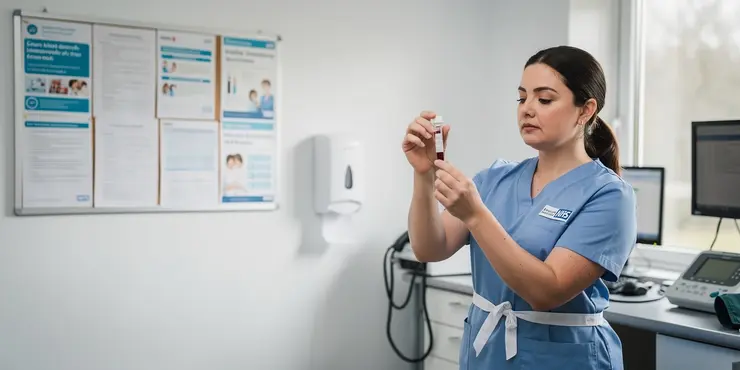
What is the most common disease transmitted by blood transfusion?
Relevance: 95%
-
What is a blood transfusion?
Relevance: 90%
-
Can you get any prion diseases from blood transfusion?
Relevance: 88%
-
Blood Product Transfusions
Relevance: 86%
-
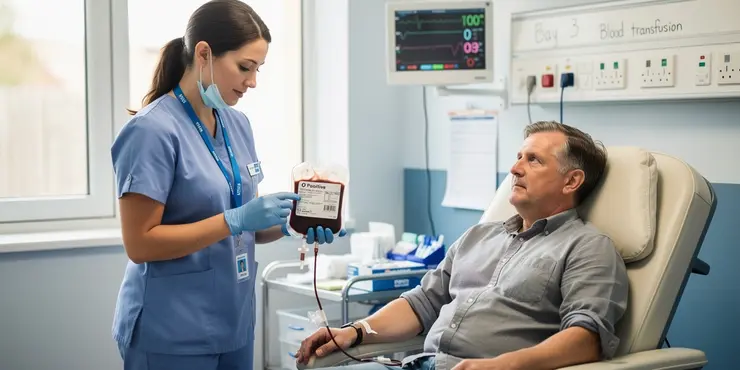
Blood Transfusion
Relevance: 86%
-
Why might someone need a blood transfusion?
Relevance: 85%
-

What measures are taken to prevent disease transmission in blood transfusions?
Relevance: 85%
-
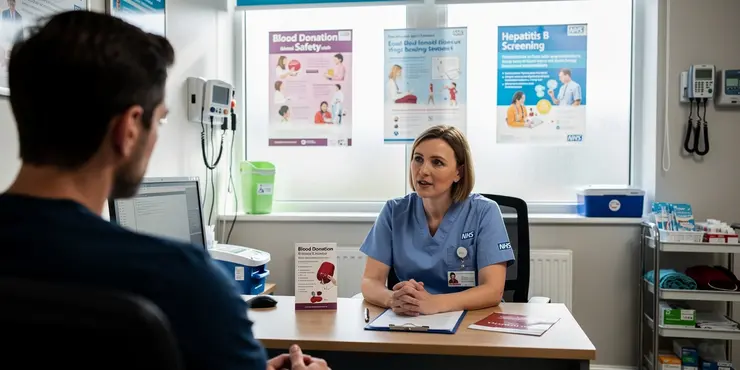
Is Hepatitis B a risk in blood transfusions?
Relevance: 83%
-

Are there risks associated with blood transfusions?
Relevance: 82%
-
What are some common reasons blood transfusions are needed?
Relevance: 82%
-
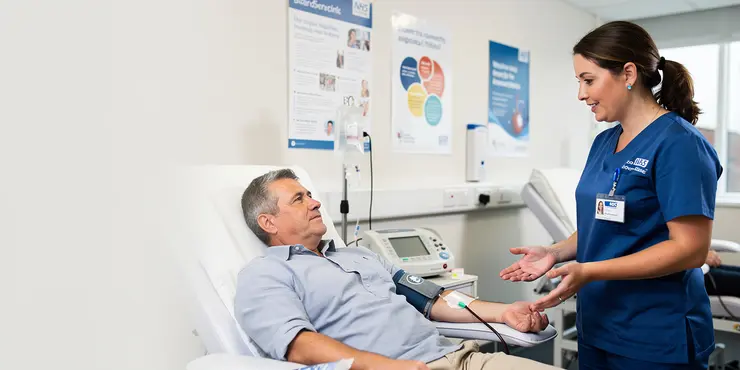
Are there any parasites that can be transmitted through blood transfusions?
Relevance: 81%
-

Is HTLV a risk in blood transfusions?
Relevance: 81%
-
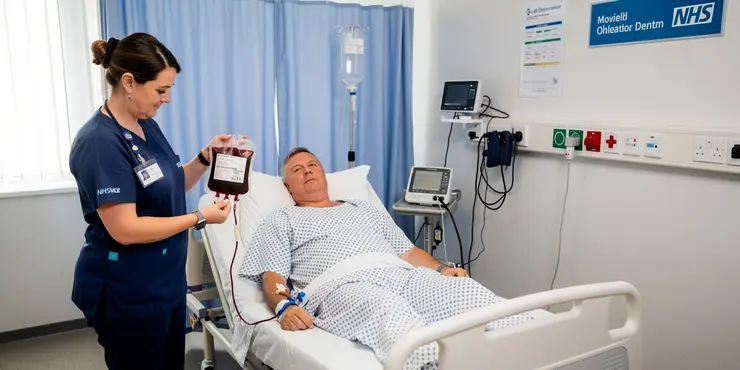
What types of blood products can be transfused?
Relevance: 79%
-

Can syphilis be transmitted via blood transfusion?
Relevance: 78%
-
Is there an age limit for receiving blood transfusions?
Relevance: 78%
-
Can certain medical conditions prevent receiving blood transfusions?
Relevance: 78%
-
Is malaria still a concern for blood transfusion safety?
Relevance: 78%
-
How long does a blood transfusion take?
Relevance: 75%
-
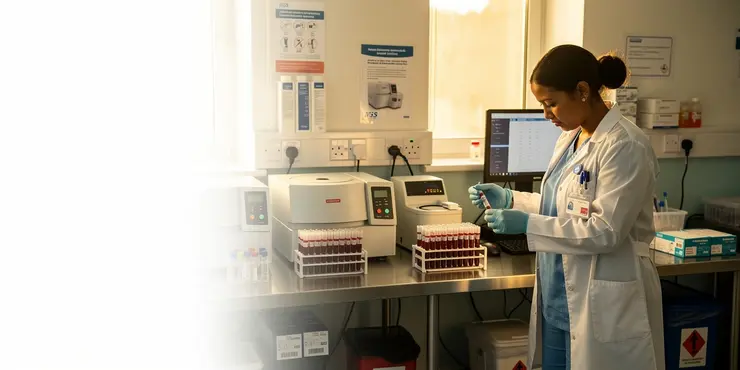
How do healthcare providers match blood for transfusions?
Relevance: 74%
-
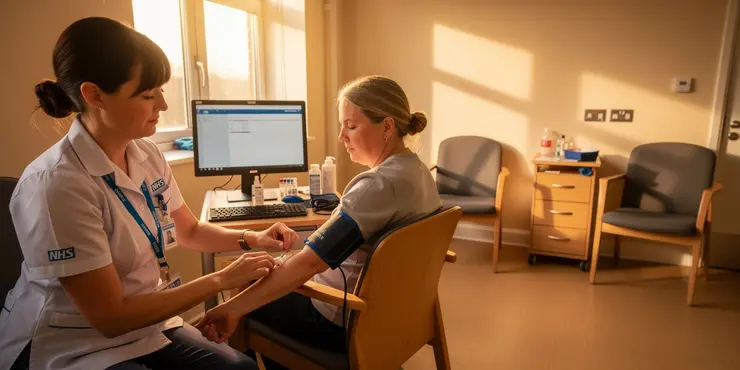
How is blood screened to prevent disease transmission?
Relevance: 74%
-
Is Zika virus screened for in blood transfusions?
Relevance: 74%
-
Can bacterial infections be transmitted through blood transfusion?
Relevance: 74%
-
Can HIV be transmitted through blood transfusions?
Relevance: 74%
-
Can Dengue fever be transmitted through blood transfusions?
Relevance: 73%
-
Can someone have a reaction to a mismatched blood transfusion?
Relevance: 73%
-
Can people of any blood type receive a transfusion of any blood type?
Relevance: 72%
-
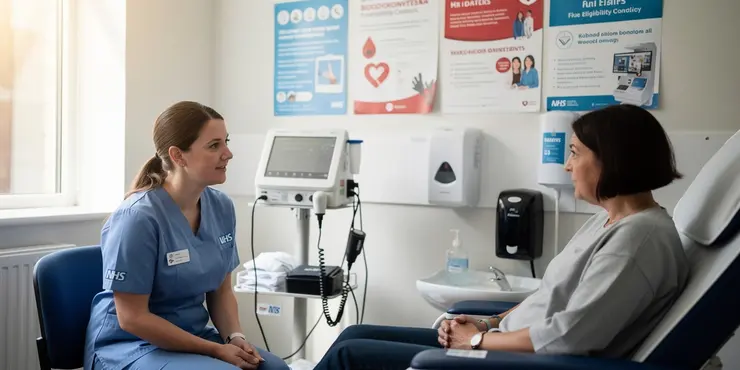
Can COVID-19 be transmitted through blood transfusions?
Relevance: 71%
-

How do doctors determine how much blood is needed for a transfusion?
Relevance: 70%
-
Is blood used for transfusions safe?
Relevance: 64%
-
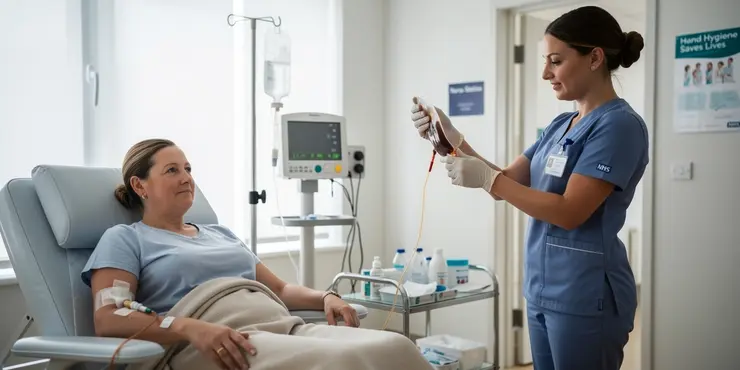
What is plasma, and why might it be transfused?
Relevance: 62%
-
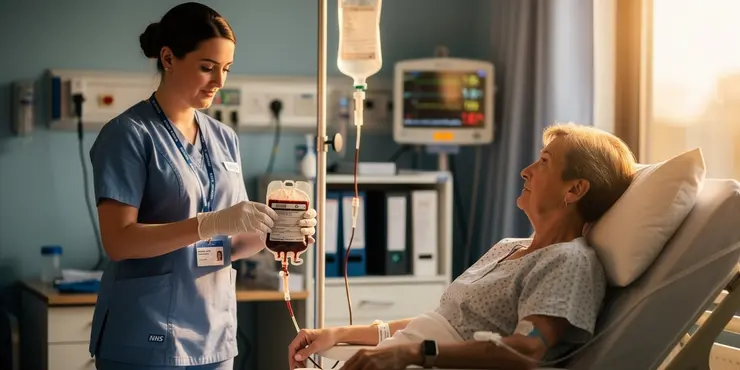
Can cytomegalovirus (CMV) be spread through transfusions?
Relevance: 56%
-
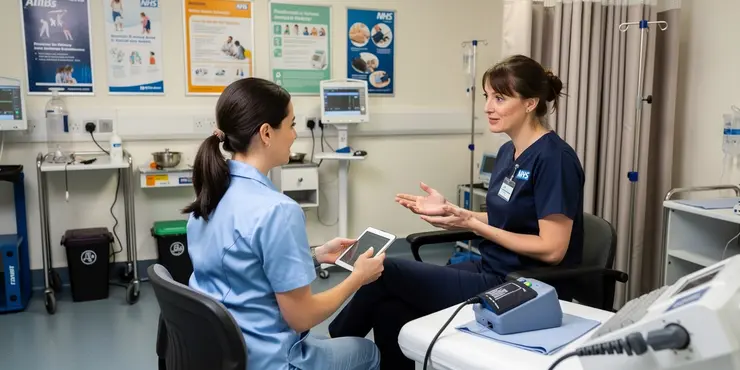
Are there global differences in screening for blood transfusions?
Relevance: 56%
-
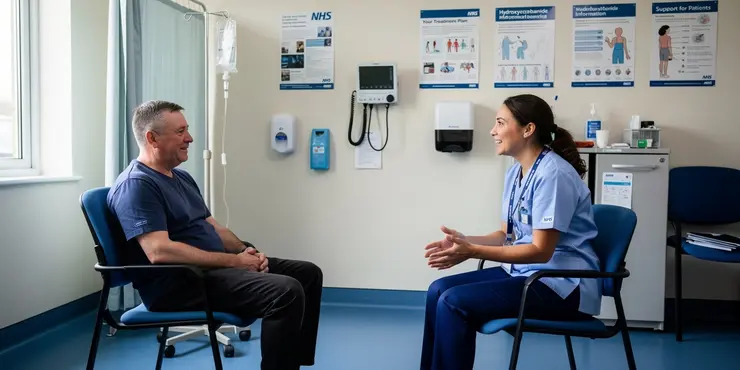
How is sickle cell disease treated?
Relevance: 54%
-
Why is blood donation history important in preventing disease transmission?
Relevance: 54%
-
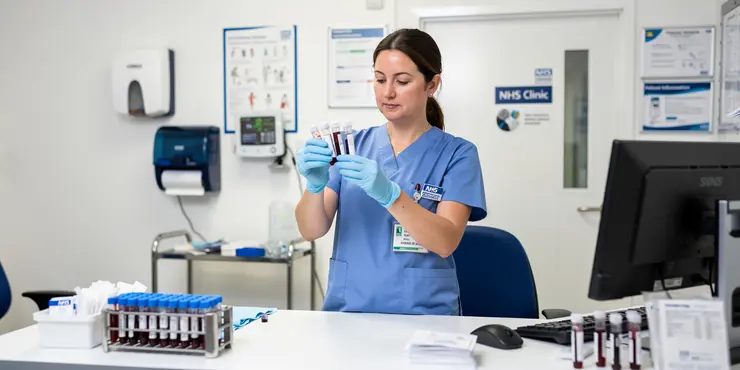
What other viruses are tested for in blood donations?
Relevance: 53%
-
What should a patient expect after a blood transfusion?
Relevance: 52%
-
What kind of follow-up care is needed after a blood transfusion?
Relevance: 50%
-

What is sickle cell disease?
Relevance: 48%
Bloodborne Diseases and Blood Transfusions
Blood transfusions are a crucial medical procedure used to replace lost components of the blood. While they save countless lives each year, there is a small risk of transmitting infectious diseases through transfusion. Over the years, rigorous screening and testing have greatly reduced these risks. Nevertheless, understanding potential bloodborne diseases remains important for both patients and healthcare providers.
Hepatitis B and C Viruses
Hepatitis B and C are viral infections that primarily affect the liver. Hepatitis B can cause both acute and chronic liver disease, while Hepatitis C is more likely to lead to chronic infection. Both viruses can be transmitted through blood transfusions if the blood is infected. In the UK, stringent screening reduces the likelihood of these viruses being present in donated blood. Nevertheless, vigilance is key, since chronic hepatitis infections can result in severe liver damage over time.
Human Immunodeficiency Virus (HIV)
Human Immunodeficiency Virus (HIV) is a virus that attacks the body’s immune system, leading to Acquired Immunodeficiency Syndrome (AIDS) if not treated. Despite advancements in antiretroviral therapy, preventing transmission remains a priority. Donated blood in the UK is subject to rigorous HIV testing to minimise the risk of transference through transfusions.
Human T-lymphotropic Virus (HTLV)
Human T-lymphotropic Virus (HTLV) is another virus that can be transmitted through blood transfusion. Primarily, it is linked to certain forms of leukemia and neurological disorders. Like other bloodborne viruses, it is relatively rare in the UK as blood is routinely screened for HTLV to prevent its transmission.
Syphilis
Syphilis is a bacterial infection typically spread through sexual contact but can be transmitted via blood. The bacteria, Treponema pallidum, can cause long-term complications if not treated. Comprehensive screening of blood donors for syphilis greatly reduces the risk of transmission through blood transfusions.
Malaria
Malaria is a tropical disease caused by Plasmodium parasites, transmitted through bites from infected mosquitoes. While it is not endemic in the UK, individuals who have travelled to malaria-prone regions may transmit it via blood transfusions. Screening for malaria exposure is part of donor screening procedures to help prevent transmission.
Zika Virus
Zika virus is primarily spread through mosquito bites, but it can also be transmitted via blood transfusions. The virus has gained attention due to its potential to cause birth defects if contracted during pregnancy. Donor screening practices include assessing travel history to regions where Zika is prevalent.
Preventive Measures in the UK
The UK has implemented stringent blood screening measures to protect recipients from bloodborne infections. Blood donations are thoroughly tested for viruses and other pathogens, and potential donors are screened for risk factors before donation. This multi-layered approach significantly reduces the risk of disease transmission through blood transfusions, ensuring safety and public confidence in blood donation services.
Bloodborne Diseases and Blood Transfusions
Blood transfusions are when doctors give people new blood to help them get better. They save many lives. But sometimes, they can pass on diseases. Many checks are done to make sure this doesn’t happen. Knowing about these diseases helps doctors and patients stay safe.
Hepatitis B and C Viruses
Hepatitis B and C are viruses that can hurt the liver. Hepatitis B can make people very sick for a short or long time. Hepatitis C usually makes people sick for a long time. These viruses can spread through blood transfusions if the blood is not checked properly. In the UK, blood is carefully checked to keep it safe. But being careful is important because these viruses can damage the liver badly.
Human Immunodeficiency Virus (HIV)
Human Immunodeficiency Virus (HIV) hurts the body's defense system. This can lead to a disease called AIDS if not treated. Doctors work hard to stop HIV from spreading. In the UK, all donated blood is tested for HIV to keep it safe for everyone.
Human T-lymphotropic Virus (HTLV)
Human T-lymphotropic Virus (HTLV) can also spread through blood transfusions. It is connected to some blood and nerve diseases. It is rare in the UK because blood is tested for HTLV before it is used.
Syphilis
Syphilis is an infection that usually spreads through close contact but can also spread through blood. If not treated, it can cause serious problems. Blood donors are tested for syphilis to make sure the blood is safe.
Malaria
Malaria is an illness from mosquito bites in hot countries. People who have traveled to places with malaria might carry it in their blood. The UK screens blood donors who have traveled to these areas to make sure no malaria is passed on through transfusions.
Zika Virus
Zika virus mostly spreads through mosquito bites and can also spread through blood transfusions. It can harm babies if a mother gets it when pregnant. Blood donors are checked for travel to areas with Zika to keep the blood supply safe.
Preventive Measures in the UK
In the UK, there are strong rules to keep blood safe. Blood donations are tested for diseases, and people are asked questions to check if they are good donors. This makes blood transfusions in the UK very safe, giving people confidence to receive and donate blood.
Frequently Asked Questions
What is the most common disease transmitted by blood transfusion?
Historically, Hepatitis C was one of the most common diseases transmitted by blood transfusions before rigorous screening methods were implemented.
Can HIV be transmitted through blood transfusions?
Yes, HIV can be transmitted through blood transfusions, but modern screening techniques have greatly reduced this risk.
How is blood screened to prevent disease transmission?
Blood is screened using sophisticated tests for various infectious agents, including viruses, bacteria, and parasites, before transfusion.
Is Hepatitis B a risk in blood transfusions?
Yes, Hepatitis B can potentially be transmitted through blood transfusions, but effective screening practices have minimized the risk.
What other viruses are tested for in blood donations?
Besides HIV and Hepatitis B and C, blood donations are tested for HTLV, West Nile Virus, and Zika Virus, among others.
Can syphilis be transmitted via blood transfusion?
Yes, syphilis can theoretically be transmitted through blood transfusions, but rigorous testing has minimized the potential for transmission.
Are there any parasites that can be transmitted through blood transfusions?
Yes, parasites such as those causing malaria can be transmitted, but donors are screened and questioned to identify risk factors.
Is Chagas disease a concern with blood transfusions?
Yes, Chagas disease, caused by Trypanosoma cruzi, is screened for in blood donations to prevent transmission.
Can cytomegalovirus (CMV) be spread through transfusions?
Yes, CMV can be transmitted via transfusions, especially to immunocompromised individuals, but seronegative blood is often used for high-risk patients.
Is Zika virus screened for in blood transfusions?
Yes, blood donations are screened for Zika virus to prevent its transmission through transfusions.
Can bacterial infections be transmitted through blood transfusion?
Yes, though rare, bacterial contamination of blood products can occur, and various measures are taken to minimize this risk.
What measures are taken to prevent disease transmission in blood transfusions?
Rigorous donor screening, advanced blood testing, pathogen reduction technologies, and stricter deferral criteria all help prevent transmission.
Is HTLV a risk in blood transfusions?
Human T-lymphotropic virus (HTLV) is tested for and screening has reduced its transmission risk in blood transfusions.
Can you get any prion diseases from blood transfusion?
The risk of transmissible spongiform encephalopathies (like Creutzfeldt-Jakob Disease) through transfusion is extremely low, and precautions are taken.
Is malaria still a concern for blood transfusion safety?
Malaria is a concern in endemic areas, and donors are screened for travel history to minimize risk.
Can Dengue fever be transmitted through blood transfusions?
Yes, Dengue virus transmission via blood transfusion is possible, but screening and donor questionnaires help reduce risk.
Are new emerging pathogens a risk for blood safety?
Yes, new pathogens continue to be a challenge, but ongoing research and updated screening protocols help manage emerging risks.
Why is blood donation history important in preventing disease transmission?
Donor history helps identify risk factors for transmissible diseases, facilitating decisions on blood safety.
Are there global differences in screening for blood transfusions?
Yes, screening standards can vary by country, but international guidelines aim to harmonize safety measures.
Can COVID-19 be transmitted through blood transfusions?
There is currently no evidence of COVID-19 transmission through blood transfusion, and blood is not screened specifically for this virus.
What disease can people get from blood transfusions the most?
A long time ago, people could get Hepatitis C from blood transfusions. This was before doctors checked the blood carefully to make sure it was safe.
Can people get HIV from blood transfusions?
People can get HIV if they receive blood that has the virus in it. But don't worry! In many places, doctors check all donated blood very carefully. They make sure the blood is safe and does not have HIV.
If you are still worried or have more questions, you can talk to your doctor. They can give you more information.
Yes, HIV can spread through blood transfusions. But today, doctors have good tests to check blood. This makes it much safer.
How Do We Check Blood to Keep It Safe from Diseases?
We check blood to make sure it is safe and doesn't spread diseases. This is how we do it:
- Test the Blood: We take a small amount of blood and look for germs that can make people sick. This helps us find and stop any diseases.
- Use Clean Tools: We use new, clean equipment to take blood. This keeps it safe and healthy.
- Ask Questions: Before taking blood, we ask the person questions. This helps us know if their blood is safe.
These steps help keep everyone healthy when they need blood.
Using Tools to Help Understand: To make reading easier, you can use tools like audiobooks or ask someone to explain the steps to you. This can help you learn in a way that works best for you.
Before blood is given to someone, it is checked very carefully. Special tests look for germs like viruses, bacteria, and tiny bugs.
Can you get Hepatitis B from a blood transfusion?
Hepatitis B is a virus. It can make you feel very sick. If you need a blood transfusion, you might worry about getting Hepatitis B.
Doctors check blood carefully. They do tests to make sure the blood is safe. This means it is very rare to get Hepatitis B from a transfusion.
If you are still worried, you can ask your doctor. They can explain how they make sure blood is safe.
Using pictures or simple charts can help you understand better. You can also ask someone you trust to explain it to you in a simple way.
Yes, Hepatitis B can spread through blood transfusions. But doctors check the blood very carefully now, so it is much safer.
What other germs do they look for in blood donations?
When you give blood, doctors check it for different germs. They look for HIV, Hepatitis B and C, as well as other viruses like HTLV, West Nile Virus, and Zika Virus. This makes sure the blood is safe.
Can you get syphilis from a blood transfusion?
Syphilis is a disease you can catch from an infected person's blood.
If the blood comes from someone with syphilis, there is a risk.
But, doctors check blood carefully before using it for transfusions.
They make sure the blood is safe and does not have diseases like syphilis.
If you have more questions or feel worried, talk to a doctor or nurse.
They can help explain things and make you feel better.
Yes, syphilis can be spread through blood transfusions. But doctors are very careful and do lots of tests to keep it from happening.
Can parasites spread through blood transfusions?
Yes, sometimes tiny bugs (called parasites) can be in blood. If someone gets a blood transfusion, these bugs can move from one person to another.
To help understand more, you can use pictures or videos. Ask someone to explain if you need help.
Yes, bugs that make you sick, like the ones that cause malaria, can be spread to other people. But doctors check and ask questions to find out if donors have these bugs.
Can you get Chagas disease from blood transfusions?
Yes, doctors check for Chagas disease in blood donations. This stops it from spreading. Chagas is caused by a germ called Trypanosoma cruzi.
Can you get CMV virus from a blood transfusion?
Yes, CMV can be passed on through blood transfusions. This is a bigger risk for people with weak immune systems. Doctors often use special blood that does not have CMV for these people.
Do they check for Zika virus in blood donations?
Yes, doctors check the blood for Zika virus before using it to help others. This stops the virus from spreading when people get blood donations.
Can you get a bacterial infection from blood transfusion?
Bacteria are tiny germs that can make you sick.
A blood transfusion means getting new blood from someone else.
It is very rare, but sometimes bacteria can be in the blood.
Doctors check the blood very carefully to keep you safe.
Tips for understanding this:
- Ask a doctor or nurse if you have questions.
- Use pictures or videos to help explain.
- Ask someone to explain it with simple words.
Yes, sometimes germs can get into blood bags, but this does not happen often. Doctors do a lot to keep blood safe.
How do we stop diseases from spreading in blood transfusions?
Doctors and nurses are very careful to keep everyone safe when they give blood. Here are some things they do:
- Testing blood: They check all the donated blood carefully to make sure it is healthy and does not have any diseases.
- Asking questions: Donors answer questions about their health and travel history to make sure their blood is safe to use.
- Using clean tools: All tools used in blood transfusions are new or properly cleaned to stop germs from spreading.
These steps help make sure that blood transfusions are safe for everyone.
We keep blood safe by doing a few important things:
- We check donors carefully to make sure they are healthy.
- We test the blood with special tests.
- We use treatments to remove bad germs.
- We have strict rules about who can give blood.
These steps help stop the spread of sickness.
Can you get sick from HTLV in a blood transfusion?
Doctors check for a virus called HTLV in blood. This helps keep the virus from spreading during blood transfusions.
Can you catch prion diseases from a blood transfusion?
A prion disease is a very rare illness that happens when a protein in your brain changes shape.
You might be worried about catching prion diseases from a blood transfusion. A blood transfusion is when you get blood from someone else to help you when you are not well.
The chance of getting prion diseases from a blood transfusion is very, very small. It does not happen often.
If you have more questions, ask a doctor or nurse. They know a lot and can help you understand better.
You can use pictures to help you understand. Talking about it with someone you trust can also make it easier to understand.
The chance of spreading certain brain diseases, like Creutzfeldt-Jakob Disease, through blood donations is very small. Doctors take special care to make sure it is even less likely.
Is malaria a worry for safe blood donations?
Malaria is an illness you can catch in some parts of the world. People who give blood are checked to see if they have traveled to places where you can catch malaria. This helps keep the blood safe.
Can you get Dengue fever from a blood transfusion?
Dengue fever is a sickness you can get from a mosquito bite. But, can you also get it if you get blood from someone else, like in a blood transfusion? Let's find out more about this.
If you are worried or have questions, you can ask a doctor. Reading tools, like audiobooks or apps that read text out loud, can help you understand better.
Yes, it is possible to get the dengue virus from a blood transfusion. But to make it safer, doctors check the blood and ask donors questions.
Can new germs make blood unsafe?
Yes, new germs can be a problem. But scientists keep learning about them, and new health checks help keep people safe.
Why is it important to know about past blood donations to stop spreading diseases?
Donor history is about knowing if someone who gives blood might have diseases that can spread. This helps decide if the blood is safe to use.
Do all countries check blood the same way before giving a transfusion?
Yes, different countries have different rules, but there are international rules to help keep things safe everywhere.
Can you catch COVID-19 from a blood transfusion?
No, you can't catch COVID-19 from a blood transfusion. Blood transfusions are safe.
If you have questions or feel worried, you can:
- Ask a doctor or nurse for help.
- Use a picture book to help understand.
- Watch a simple video about blood transfusions.
There is no proof that you can get COVID-19 from a blood transfusion. Blood is not checked for this virus.
Useful Links
This website offers general information and is not a substitute for professional advice.
Always seek guidance from qualified professionals.
If you have any medical concerns or need urgent help, contact a healthcare professional or emergency services immediately.
Some of this content was generated with AI assistance. We’ve done our best to keep it accurate, helpful, and human-friendly.
- Ergsy carfully checks the information in the videos we provide here.
- Videos shown by Youtube after a video has completed, have NOT been reviewed by ERGSY.
- To view, click the arrow in centre of video.
- Most of the videos you find here will have subtitles and/or closed captions available.
- You may need to turn these on, and choose your preferred language.
- Go to the video you'd like to watch.
- If closed captions (CC) are available, settings will be visible on the bottom right of the video player.
- To turn on Captions, click settings .
- To turn off Captions, click settings again.
More Items From Ergsy search
-

Is Chagas disease a concern with blood transfusions?
Relevance: 100%
-

What diseases can be spread by blood transfusions?
Relevance: 98%
-

What is the most common disease transmitted by blood transfusion?
Relevance: 95%
-
What is a blood transfusion?
Relevance: 90%
-
Can you get any prion diseases from blood transfusion?
Relevance: 88%
-
Blood Product Transfusions
Relevance: 86%
-

Blood Transfusion
Relevance: 86%
-
Why might someone need a blood transfusion?
Relevance: 85%
-

What measures are taken to prevent disease transmission in blood transfusions?
Relevance: 85%
-

Is Hepatitis B a risk in blood transfusions?
Relevance: 83%
-

Are there risks associated with blood transfusions?
Relevance: 82%
-
What are some common reasons blood transfusions are needed?
Relevance: 82%
-

Are there any parasites that can be transmitted through blood transfusions?
Relevance: 81%
-

Is HTLV a risk in blood transfusions?
Relevance: 81%
-

What types of blood products can be transfused?
Relevance: 79%
-

Can syphilis be transmitted via blood transfusion?
Relevance: 78%
-
Is there an age limit for receiving blood transfusions?
Relevance: 78%
-
Can certain medical conditions prevent receiving blood transfusions?
Relevance: 78%
-
Is malaria still a concern for blood transfusion safety?
Relevance: 78%
-
How long does a blood transfusion take?
Relevance: 75%
-

How do healthcare providers match blood for transfusions?
Relevance: 74%
-

How is blood screened to prevent disease transmission?
Relevance: 74%
-
Is Zika virus screened for in blood transfusions?
Relevance: 74%
-
Can bacterial infections be transmitted through blood transfusion?
Relevance: 74%
-
Can HIV be transmitted through blood transfusions?
Relevance: 74%
-
Can Dengue fever be transmitted through blood transfusions?
Relevance: 73%
-
Can someone have a reaction to a mismatched blood transfusion?
Relevance: 73%
-
Can people of any blood type receive a transfusion of any blood type?
Relevance: 72%
-

Can COVID-19 be transmitted through blood transfusions?
Relevance: 71%
-

How do doctors determine how much blood is needed for a transfusion?
Relevance: 70%
-
Is blood used for transfusions safe?
Relevance: 64%
-

What is plasma, and why might it be transfused?
Relevance: 62%
-

Can cytomegalovirus (CMV) be spread through transfusions?
Relevance: 56%
-

Are there global differences in screening for blood transfusions?
Relevance: 56%
-

How is sickle cell disease treated?
Relevance: 54%
-
Why is blood donation history important in preventing disease transmission?
Relevance: 54%
-

What other viruses are tested for in blood donations?
Relevance: 53%
-
What should a patient expect after a blood transfusion?
Relevance: 52%
-
What kind of follow-up care is needed after a blood transfusion?
Relevance: 50%
-

What is sickle cell disease?
Relevance: 48%


